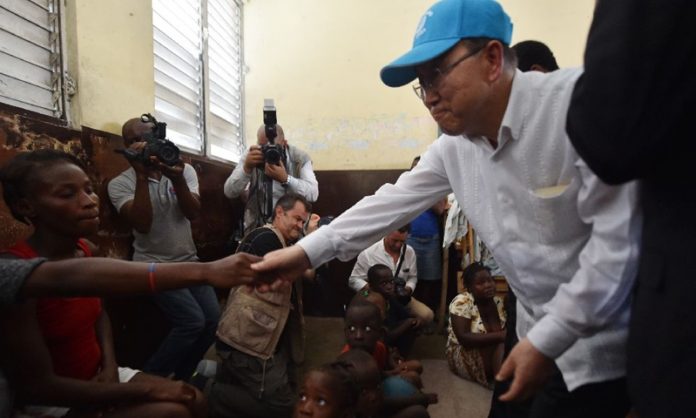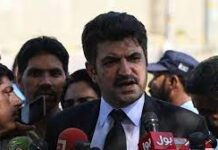PORT-AU-PRINCE: UN Secretary General Ban Ki-moon on Saturday voiced distress at the devastation caused by a deadly hurricane in Haiti, making an urgent plea for emergency aid as he visited the worst-hit parts of the Caribbean nation.
“I was very, very sad when we saw the complete devastation. But people the world over stand with you,” the UN chief said, speaking in French, after a helicopter overflight of the southern portion of the country.
“The United Nations stands by your side. We will mobilize all resources to help you,” he added as he arrived at a high school in the town of Les Cayes, one of the worst affected by Hurricane Matthew when it crashed ashore on October 4, packing winds of 145 miles (230 kilometers) per hour.
At least 546 people were killed, and more than 175,000 people have lost their homes.
The streets have been cleaned. The branches and tree trunks form massive heaps on the sidewalks. Businesses have reopened.
Ban was warmly received at Philippe Guerrier high school, where more than 500 people are still huddled. He spoke with a young man who was wounded, before telling the displaced: “kembe fem” in Creole (“hang in there”).
He then headed back to the capital Port-au-Prince by helicopter.
The UN Mission in Haiti (MINUSTAH) said Ban was meeting with national and local authorities, as well as representatives of affected communities and humanitarian emergency teams.
Ban said Monday that a “massive response” was needed to cope with the destruction, with 1.4 million people in need of urgent assistance after towns and villages were almost wiped off the map.
The United Nations has launched a flash appeal for $120 million to help Haiti, the poorest country in the Western Hemisphere, cope with its worst humanitarian crisis since a devastating 2010 earthquake.
But so far, only about 12 percent of the needed funds has been raised to help stave off famine and serious health crises, including cholera.
– Cholera on the rise –
In addition to the destruction of countless homes and farms, Haitians in the worst-affected areas are dealing with a lack of potable water, which is contributing to the spread of disease.
Haiti has been plagued for half a dozen years by cholera, which has claimed close to 10,000 lives, despite extensive efforts to combat it.
The malady was brought to Haiti by UN peacekeepers from Nepal, who were helping in the aftermath of the earthquake.
Officials have seen evidence of a new spike in cholera cases, which prompted the World Health Organization last week to announce it was sending an additional one million doses of vaccine to Haiti.
The UN Security Council, meanwhile, agreed earlier this week to extend MINUSTAH’s stay until April of next year to help combat the myriad crises in the aftermath of Matthew.
The hurricane also prompted election officials to push back already delayed presidential and legislative elections until November 20.
The elections are a do-over after an earlier vote had to be annulled because of violence and massive fraud.





